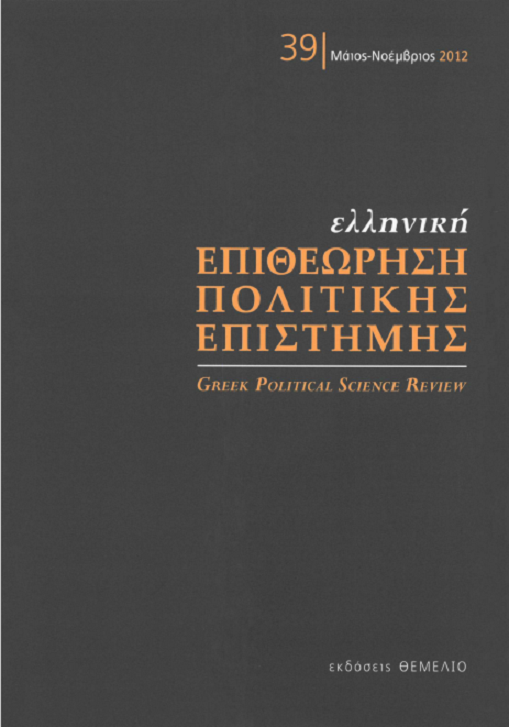Η ισχύς εν τη πιστώσει: η Γερμανία και το έλλειμμα ηγεσίας της Ευρωζώνης
Abstract
Οι προσπάθειες των ευρωπαϊκών κυβερνήσεων και θεσμών για την αντιμετώπιση της κρίσης χρέους έχουν αποδειχθεί αναποτελεσματικές, με αποτέλεσμα, δυο χρόνια μετά την έναρξη της κρίσης, να απειλείται ακόμα και η βιωσιμότητα της ίδιας της Οικονομικής και Νομισματικής Ένωσης (ΟΝΕ). Το άρθρο αυτό εξετάζει έναν από τους σημαντικότερους λόγους για την αναποτελεσματική διαχείριση της κρίσης: το έλλειμμα ηγεσίας στην Ευρωζώνη. Η ανάλυση επικεντρώνεται στον ρόλο της Γερμανίας, η οποία έχει αναδειχθεί σε αδιαφάονίκητο οικονομικό ηγεμόνα της Ευρώπης. Η οικονομική ισχύς της και η επακόλουθη πολιτική επιρροή της όμως δεν έχουν μετουσιωθεί σε πολιτική ηγεσία ικανή να επαναφέρει την Ευρωζώνη σε οικονομική σταθερότητα και ανάπτυξη. Αντίθετα, η Γερμανία δείχνει απροθυμία να αναλάβει την ευθύνη άσκησης ηγεσίας και το κόστος που αυτή συνεπάγεται. Το άρθρο αναλύει τους λόγους για τη στάση αυτή και επιχειρεί να σκιαγραφήσει τις επιπτώσεις της για το μέλλον της ΟΝΕ.
Article Details
- Come citare
-
Κατσίκας Δ. (2017). Η ισχύς εν τη πιστώσει: η Γερμανία και το έλλειμμα ηγεσίας της Ευρωζώνης. Ελληνική Επιθεώρηση Πολιτικής Επιστήμης, 39, 59–83. https://doi.org/10.12681/hpsa.14546
- Sezione
- Αφιέρωμα

Questo lavoro è fornito con la licenza Creative Commons Attribuzione - Non commerciale - Condividi allo stesso modo 4.0 Internazionale.
Οι συγγραφείς θα πρέπει να είναι σύμφωνοι με τα παρακάτω: Οι συγγραφείς των άρθρων που δημοσιεύονται στο περιοδικό διατηρούν τα δικαιώματα πνευματικής ιδιοκτησίας επί των άρθρων τους, δίνοντας στο περιοδικό το δικαίωμα της πρώτης δημοσίευσης. Άρθρα που δημοσιεύονται στο περιοδικό διατίθενται με άδεια Creative Commons 4.0 και σύμφωνα με την οποία μπορούν να χρησιμοποιούνται ελεύθερα, με αναφορά στο/στη συγγραφέα και στην πρώτη δημοσίευση για μη κερδοσκοπικούς σκοπούς και με δικαίωμα τροποποίησης μόνο με παρόμοια διανομή (αν αναμείξετε, τροποποιήσετε, ή δημιουργήσετε πάνω στο υλικό, πρέπει να διανείμετε τις δικές σας συνεισφορές υπό την ίδια άδεια όπως και το πρωτότυπο).


